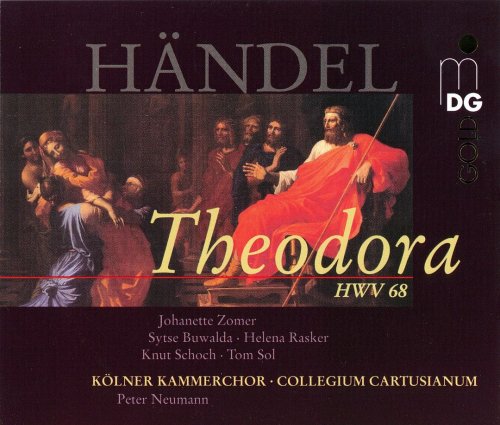
Peter Neumann - Handel: Theodora (2000)
BAND/ARTIST: Kölner Kammerchor, Collegium Cartusianum & Peter Neumann
- Title: Handel: Theodora
- Year Of Release: 2000
- Label: Md&G Records
- Genre: Classical
- Quality: FLAC (image + .cue, log, scans)
- Total Time: 2:35:57
- Total Size: 679 MB
- WebSite: Album Preview
Written in the summer of 1749, Theodora was premiered in London at Covent Garden Theatre on 16 March 1750. This work, which Handel considered his finest oratorio, was a failure at first - Handel said bitterly that the hall was so empty that "there was room enough to dance there." Part of this failure could be explained by the earthquake that hit London in February of the same year and caused the upper classes to flee the city, but another possibility is that the subject matter of the oratorio - the rebellion of a woman against the power of the state - was a bit ahead of its time.
Theodora was the only oratorio that Handel specifically scored for a castrato - the role of Didymus. In this recording, this part is sung by Syste Buwalda, who is not in his best form. (This singer has performed in many Bach cantatas recorded by Jan Pieter Leusink, and is more often than not out of form.) He seems to be rehearsing rather than truly singing. Theodora contains a great many choral movements, more than many of Handel’s other oratorios. As in all of Peter Neumann’s recordings of Handel’s works, the choir is excellent; neither too heavy nor too distant, and with excellently clear articulation. This is, in part, due to the usual high recording quality of these works, but also due to the simply excellent choir.
Tenor Knut Schoch is excellent in the role of Septimus, and his performance of the long aria Descend, kind Pity, heavenly Guest, is very good. Singing in a very laid-back style, he fits this music ideally. Mezzo soprano Helena Rasker is magnificent. Her beautiful voice flows with the music, and she injects a great deal of feeling into her singing. One of her best performances is the slow aria As with rosy steps the Morn in Act I. A bit less vibrato would be perfect, but she is indeed a fine singer. Soprano Johanette Zomer, singing the role of Theodora, has another fine voice, and, like most of the soloists in this work, stands out in one of Handel’s signature slow, flowing arias. In this case, it is With Darkness, deep as is my woe in Act II. Zomer’s voice is liquid and pure, and her dynamics with the gentle accompaniment are magnificent. This aria is part of a six-part section of this work, which includes two recitatives and arias, and two brief sinfonias (the only instrumental sections other than the three-movement overture). These six sections appear at approximately the centre of the work, and constitute a beautiful miniature act, full of tension and drama, with Theodora in the spotlight.
This is a truly satisfying recording, allying some excellent soloists with the fine orchestra and choir with which listeners are familiar from Peter Neumann’s other recordings. This oratorio contains some of Handel’s finest music, and this is one of its best recordings. ~ Kirk McElhearn, MusicWeb-International
Theodora was the only oratorio that Handel specifically scored for a castrato - the role of Didymus. In this recording, this part is sung by Syste Buwalda, who is not in his best form. (This singer has performed in many Bach cantatas recorded by Jan Pieter Leusink, and is more often than not out of form.) He seems to be rehearsing rather than truly singing. Theodora contains a great many choral movements, more than many of Handel’s other oratorios. As in all of Peter Neumann’s recordings of Handel’s works, the choir is excellent; neither too heavy nor too distant, and with excellently clear articulation. This is, in part, due to the usual high recording quality of these works, but also due to the simply excellent choir.
Tenor Knut Schoch is excellent in the role of Septimus, and his performance of the long aria Descend, kind Pity, heavenly Guest, is very good. Singing in a very laid-back style, he fits this music ideally. Mezzo soprano Helena Rasker is magnificent. Her beautiful voice flows with the music, and she injects a great deal of feeling into her singing. One of her best performances is the slow aria As with rosy steps the Morn in Act I. A bit less vibrato would be perfect, but she is indeed a fine singer. Soprano Johanette Zomer, singing the role of Theodora, has another fine voice, and, like most of the soloists in this work, stands out in one of Handel’s signature slow, flowing arias. In this case, it is With Darkness, deep as is my woe in Act II. Zomer’s voice is liquid and pure, and her dynamics with the gentle accompaniment are magnificent. This aria is part of a six-part section of this work, which includes two recitatives and arias, and two brief sinfonias (the only instrumental sections other than the three-movement overture). These six sections appear at approximately the centre of the work, and constitute a beautiful miniature act, full of tension and drama, with Theodora in the spotlight.
This is a truly satisfying recording, allying some excellent soloists with the fine orchestra and choir with which listeners are familiar from Peter Neumann’s other recordings. This oratorio contains some of Handel’s finest music, and this is one of its best recordings. ~ Kirk McElhearn, MusicWeb-International
Classical | FLAC / APE | CD-Rip
As a ISRA.CLOUD's PREMIUM member you will have the following benefits:
- Unlimited high speed downloads
- Download directly without waiting time
- Unlimited parallel downloads
- Support for download accelerators
- No advertising
- Resume broken downloads



